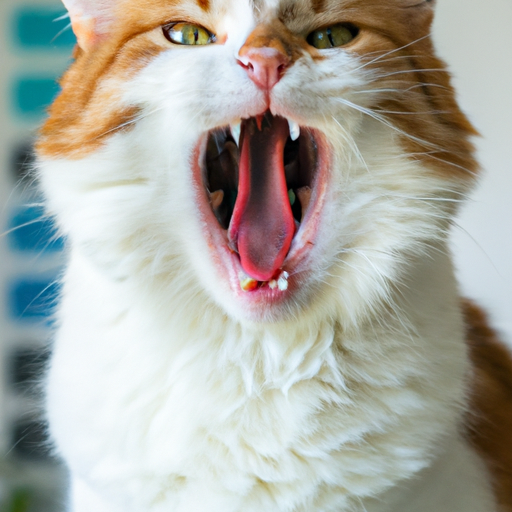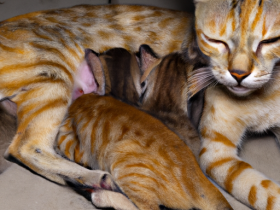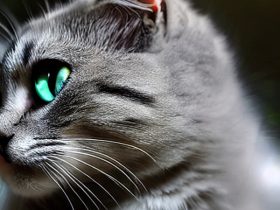“Say Goodbye to Meowing Madness – Get Your Cat to Purrfectly Calm!”
Introduction
If you have a cat, you know that meowing is a normal part of their behavior. However, if your cat is meowing constantly, it can be annoying and disruptive. Fortunately, there are some steps you can take to help your cat stop meowing constantly. In this article, we will discuss how to get your cat to stop meowing constantly. We will cover topics such as understanding why cats meow, providing your cat with the right environment, and providing your cat with the right amount of attention. By following these steps, you can help your cat stop meowing constantly and enjoy a peaceful home.
Understanding Why Your Cat is Meowing Constantly
Cats are known for their vocalizations, and meowing is one of the most common sounds they make. While cats may meow for a variety of reasons, it is important to understand why your cat is meowing constantly in order to provide the best care for them.
One of the most common reasons cats meow is to communicate with their owners. Cats may meow to get attention, to ask for food, or to let their owners know they are feeling lonely or bored. If your cat is meowing constantly, it is important to take the time to interact with them and provide them with the attention they need.
Cats may also meow to express discomfort or pain. If your cat is meowing constantly, it is important to take them to the vet to rule out any medical issues. Cats may meow due to a variety of medical conditions, such as urinary tract infections, arthritis, or dental problems.
In some cases, cats may meow excessively due to anxiety or stress. If your cat is meowing constantly, it is important to identify the source of their stress and take steps to reduce it. This may include providing them with a safe and comfortable environment, introducing new toys or activities, or providing them with more attention and affection.
Finally, cats may meow excessively due to old age. As cats age, they may become more vocal due to cognitive decline or changes in their vision or hearing. If your cat is meowing constantly due to old age, it is important to provide them with a comfortable and safe environment and to take them to the vet for regular check-ups.
Understanding why your cat is meowing constantly is essential for providing them with the best care. If your cat is meowing excessively, it is important to take the time to identify the source of their distress and take steps to reduce it.
Training Your Cat to Stop Excessive Meowing
Excessive meowing is a common problem among cats, and it can be a source of frustration for pet owners. Fortunately, there are a few steps you can take to help train your cat to stop meowing excessively.
First, it is important to understand why cats meow. Cats meow to communicate with their owners, and they may meow for attention, food, or to express discomfort. If your cat is meowing excessively, it is important to identify the cause of the behavior and address it.
If your cat is meowing for attention, it is important to ignore the behavior. Do not respond to your cat’s meowing, as this will only reinforce the behavior. Instead, wait until your cat is quiet and then reward them with attention. This will help your cat learn that meowing does not result in attention.
If your cat is meowing for food, it is important to establish a regular feeding schedule. Feed your cat at the same time each day and do not give them extra food outside of their regular meals. This will help your cat learn that meowing does not result in extra food.
If your cat is meowing due to discomfort, it is important to identify the source of the discomfort and address it. This could include providing a comfortable bed, making sure your cat has access to a litter box, or taking them to the vet for a check-up.
Finally, it is important to provide your cat with plenty of mental and physical stimulation. This can include playing with toys, providing scratching posts, and spending time with your cat. This will help keep your cat entertained and reduce their need to meow excessively.
By following these steps, you can help train your cat to stop meowing excessively. With patience and consistency, you can help your cat learn to communicate in more appropriate ways.
Creating a Positive Environment to Discourage Meowing
Creating a positive environment for your cat is essential to discourage meowing. Cats meow for a variety of reasons, including to communicate with their owners, to express hunger or discomfort, or to mark their territory. To reduce meowing, it is important to understand why your cat is meowing and to create an environment that meets their needs.
First, make sure your cat has plenty of food and water. Cats may meow to express hunger, so providing them with a consistent source of food and water can help reduce meowing. Additionally, make sure your cat has access to a litter box and that it is kept clean. Cats may meow if they are uncomfortable with their litter box, so providing a clean and comfortable space can help reduce meowing.
Second, provide your cat with plenty of toys and activities. Cats may meow out of boredom, so providing them with toys and activities can help keep them entertained and reduce meowing. Additionally, make sure your cat has plenty of places to hide and explore. Cats may meow to mark their territory, so providing them with a safe and secure environment can help reduce meowing.
Finally, spend time with your cat. Cats may meow to communicate with their owners, so spending time with them can help reduce meowing. Additionally, make sure to provide your cat with plenty of love and affection. Cats may meow out of loneliness, so providing them with love and attention can help reduce meowing.
By understanding why your cat is meowing and creating a positive environment that meets their needs, you can help reduce meowing and create a more peaceful home.
Using Positive Reinforcement to Discourage Meowing
Meowing is a common behavior among cats, but it can become a nuisance if it is done excessively. Fortunately, there are ways to discourage this behavior using positive reinforcement.
Positive reinforcement is a type of training that rewards desired behaviors. It is based on the idea that animals, including cats, are more likely to repeat behaviors that are rewarded. To use positive reinforcement to discourage meowing, you should first identify the situations in which your cat meows. Common triggers include hunger, boredom, and attention-seeking.
Once you have identified the triggers, you can begin to reward your cat for not meowing. For example, if your cat meows when it is hungry, you can reward it with a treat when it does not meow. If your cat meows when it wants attention, you can reward it with a pet or a play session when it does not meow.
It is important to remember that positive reinforcement works best when it is used consistently. You should also be sure to reward your cat immediately after it stops meowing. This will help your cat to understand that the desired behavior is not meowing, but rather not meowing.
Finally, it is important to remember that positive reinforcement should be used in combination with other methods of discouraging meowing. For example, if your cat meows when it is bored, you should provide it with toys and activities to keep it entertained.
By using positive reinforcement to discourage meowing, you can help your cat to learn that meowing is not an appropriate behavior. With patience and consistency, you can help your cat to develop more desirable behaviors.
Exploring Medical Causes of Excessive Meowing in Cats
Excessive meowing in cats is a common behavior that can be caused by a variety of medical conditions. While some cats may meow more than others, it is important to be aware of the potential medical causes of excessive meowing in cats.
One of the most common medical causes of excessive meowing in cats is hyperthyroidism. Hyperthyroidism is a condition in which the thyroid gland produces too much of the hormone thyroxine. This can cause cats to become more vocal, as well as experience weight loss, increased appetite, and increased thirst. If your cat is exhibiting any of these symptoms, it is important to take them to the vet for a checkup.
Another medical cause of excessive meowing in cats is kidney disease. Kidney disease can cause cats to become more vocal due to the buildup of toxins in their bodies. Cats with kidney disease may also experience weight loss, increased thirst, and decreased appetite. If your cat is exhibiting any of these symptoms, it is important to take them to the vet for a checkup.
Finally, cats may also meow excessively due to pain or discomfort. Cats may meow more if they are in pain due to an injury or illness. If your cat is meowing more than usual, it is important to take them to the vet to rule out any underlying medical conditions.
In conclusion, excessive meowing in cats can be caused by a variety of medical conditions. If your cat is meowing more than usual, it is important to take them to the vet for a checkup to rule out any underlying medical conditions.
Q&A
1. What are some possible reasons why my cat is meowing constantly?
Possible reasons for excessive meowing include boredom, hunger, attention-seeking, anxiety, pain, or illness. It is important to rule out any medical issues before attempting to address the behavior.
2. How can I tell if my cat is meowing for attention?
If your cat is meowing for attention, they may follow you around the house, rub against your legs, or meow when you enter a room.
3. What can I do to stop my cat from meowing constantly?
To stop your cat from meowing constantly, try providing them with more interactive toys, increasing their playtime, and providing them with more mental stimulation. Additionally, make sure they are getting enough food and water, and that their litter box is clean.
4. How can I tell if my cat is meowing due to anxiety?
If your cat is meowing due to anxiety, they may be pacing, hiding, or displaying other signs of distress.
5. What should I do if my cat is meowing due to pain or illness?
If your cat is meowing due to pain or illness, it is important to take them to the vet for a checkup. Your vet can help diagnose and treat any underlying medical issues.
Conclusion
In conclusion, getting your cat to stop meowing constantly can be a difficult task, but it is possible. By understanding why your cat is meowing, providing them with the necessary resources, and using positive reinforcement, you can help your cat to stop meowing constantly. With patience and consistency, you can help your cat to learn to meow less and enjoy a more peaceful home.








Leave a Reply
View Comments